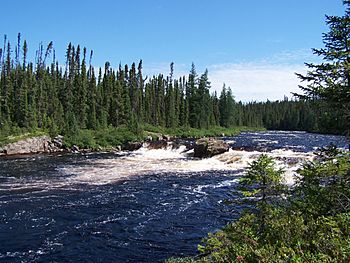Mistassibi River facts for kids
Quick facts for kids Mistassibi River |
|
|---|---|
 |
|
| Country | Canada |
| Province | Quebec |
| Region | Saguenay–Lac-Saint-Jean |
| Physical characteristics | |
| Main source | Unnamed wilderness 575 m (1,886 ft) 51°07′31″N 72°03′06″W / 51.12528°N 72.05167°W |
| River mouth | Mistassini River Dolbeau-Mistassini 115 m (377 ft) 48°53′04″N 72°13′05″W / 48.88444°N 72.21806°W |
| Length | 298 km (185 mi) |
| Basin features | |
| Basin size | 9,325 km2 (3,600 sq mi) |
| Tributaries |
|
The Mistassibi River is a long river found in the central part of Quebec, Canada. It stretches for about 298 kilometers (185 miles). The area of land that drains into this river, called its drainage basin, covers a huge 9,325 square kilometers (3,600 square miles).
Where the River Flows
The Mistassibi River starts in an area with many unnamed lakes. This spot is about 50 kilometers (31 miles) east of Canso Bay, which is part of Lake Albanel. Lake Albanel is also near the larger Lake Mistassini.
The river flows mainly from north to south, just like the nearby Mistassini River. As it travels, it passes through a lake called Lac au Foin, which means "Hay Lake." Several smaller rivers flow into the Mistassibi, adding to its waters. These include the aux Oiseaux, du Dépôt, and North-East Mistassibi Rivers. Finally, the Mistassibi River joins the Mistassini River in the town of Dolbeau-Mistassini.
What's in a Name?
The name Mistassibi has been used since the late 1800s. It comes from the Innu-aimun language, which is spoken by the Innu people. In their language, "Mistassibi" means "large river." Before this name became common, the river was sometimes called Rivière aux Foins, which means "Hay River" in French.
Power from the River
Since the year 2000, a company called Minashtuk Inc. has been operating a special kind of power station on the Mistassibi River. This is a run-of-the-river hydroelectric power station. This type of station uses the natural flow of the river to create electricity, rather than needing a very large dam to store water. It can produce 12 megawatts of power, which is enough electricity for many homes and businesses.
 | Aaron Henry |
 | T. R. M. Howard |
 | Jesse Jackson |

